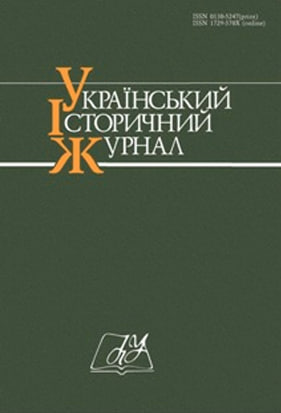Ivan Mazepa as an Early Modern Ruler
DOI:
https://doi.org/10.15407/uhj2024.05.040Keywords:
Cossack Hetmanate, I. Mazepa, Cossack Officials, Muscovite Tsardom, Rzeczpospolita, diplomacy, army, state governanceAbstract
The purpose of the article is to analyze the figure of Hetman Ivan Mazepa and his activities in the context of institutional, social, and worldview changes experienced by the states of Early Modern Europe.
Retrospective analysis of the numerous factual material accumulated in Mazepian studies requires the application of new methodological approaches, in particular, a synchronous comparison of these spheres of the hetman’s activities with the trends of changes in the role of the ruler developed by the modern new political history.
The main results of the study are a consistent consideration of various aspects of Mazepa’s activity through the prism of the hetmanate’s political ideology, his relations with secular and church elites, and the main directions and nature of foreign and domestic policy. Changes in the interpretation of the ruler’s personality by political texts and eulogies of the era are analyzed, the hetman’s preference for diplomatic methods over military ones is noted, the peculiarities of the development of military institutions of the hetmanate against the background of the Military Revolution are revealed. The author sees the prospect of further studies on the role and functions of hetmans as early modern rulers in their comparative analysis with the rulers of the tributary states of Central-Eastern Europe. The conclusions substantiate the “typicality” of Mazepa’s role and activity in the government landscape of Early Modern Europe, consistent with the trends of the 17th century, which preserved many pre-modern features in the status and functions of the rulers. The power of the hetman was based on the political elite and institutions created as a result of the synthesis of the Rzeczpospolita and Cossack political traditions. The combination of these trends formed a “participatory” model of management and distribution of power prerogatives. They were based on a balance between vertical power hierarchies and horizontal connections. This model of the political system did not undergo modernization even under the influence of wars and other geopolitical challenges of the late 17th and early 18th centuries, at a time when neighboring states, in the struggle for political and military leadership, began to improve their mechanisms for mobilizing military and economic potential.


